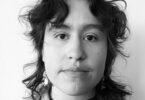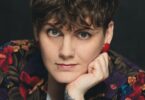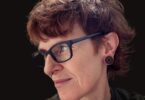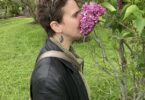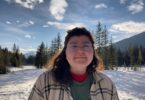Holly C. Lam
She named the dog Whisky so they wouldn’t become alcoholics. She adopted him six months after she finally boxed the clothes and toys and jammed them into the crawlspace. She got the dog for Boyd, to give him a routine. But Boyd wouldn’t walk the dog, wouldn’t feed the dog, wouldn’t touch the dog. He just watched any apocalypse movie he could stream on the Internet, Children of Men to Noah, and did a bunch of what he called research, but what Annalee suspected amounted to poring over a Reddit sub-thread. “Emergency preparedness!” he ranted. “Did you know we’re in an earthquake region with a high probability for damage?” His elevated brow stretched his skin smooth up to the hairline, where three wrinkles bulged like earthworms. The Last Man on Earth led him to a whole undead phase and he got into zombies, Night of the Living Dead to 28 Days Later. “The zombie apocalypse could come any day now, too. I’m convinced.” He said they had room in the crawlspace for a full disaster kit.
An old iMac, her father’s rice-patterned dishes, chairs that used to be projects but remained three-legged with partial upholstery—the crawlspace was full of junk. And boxes. “You don’t want to go in there, Boyd,” she said. He’d remained couch-prone, face drawn, while she removed the clothes from the dresser, and the rest from the closet, clothes bought too big, mostly by Boyd, waiting to be worn. If he opened a box unsuspectingly and found the tiny Habs jersey—it wouldn’t end well. The dog was a much safer bet.
“He’s a Manchester Terrier,” she said. “The woman at the SPCA claimed they’re the perfect size for city life.”
“This,” said Boyd, and pointed accusingly at Whisky, “is not what I wanted.” Whisky jumped to waist-height and yapped. Boyd backed away, pushed his glasses up his nose.
“It’s what we have,” she said. She scooped Whisky up by the middle and took him for a walk.
Normally she’d have strolled west, out of habit, to Laura’s, but the previous Friday Laura had applied for a research position in Ottawa, to start after she defended her thesis at summer’s end. Annalee said she would personally recommend Laura because she had TA’d at Concordia with Linus Baxter, the lead researcher. But she hadn’t yet. So she walked east, then up Parc Avenue to Mount Royal, past the twenty-somethings who reclined on Mexican blankets and smoked and played mandolins, up the path shaded by hickory and white birch trees. The jousters were out—they convened in the clearing west of the Cartier monument, oddballs in medieval armour who clanged swords and greeted each other with words like “scoundrel.” At the clamour, Whisky froze on the edge of the path, ears and nose quivering.
◊ ◊ ◊
A week later, the six a.m. news blared. Beside her, Boyd remained unaware of a seven-car pile-up on the 511, and that a woman who’d kidnapped her own daughter and taken her to Iceland was now on trial at the courthouse downtown. She left his Frankenstein-shaped head cradled on the pillow, T-shirt scrunched above his navel. He used to sleep only in boxers, but when she turned thirty-five she asked him to stop. If she wore a shirt, he should.
Whisky was not allowed in bed. He had his own cushion and was awake when she got to the kitchen, tail curled like a black pipe cleaner—she should marry Whisky.
She and Boyd had the ground floor of a walk-up, which meant they had the backyard. In winter the first floor had pros and cons: less risk they’d slip and kill themselves on the way up, but also a danger of snow-ins, like the year before. Three and a half feet. In summer you had to take off your clothes to breathe. She opened the windows. The one in the kitchen had bars the diameter of English cucumbers. “Things happen, Annalee,” Boyd had warned when they moved in—eight summers ago, already. The first week in the apartment, she forgot her key, and Boyd phoned the police before he realized the shadow outside was her. “Sorry, I do apologize,” he said to the cop. He pushed his glasses up his nose while she sank to the floor with laughter, the floor because they had no furniture. Every June, she thought to grow vines around the bars. She should tell Boyd to do it. He liked to garden.
She clipped the leash to Whisky’s collar, closed the front door but didn’t lock it. She’d started taking chances like this. What could possibly happen? What more?
On the street corner, a Hasidic Jewish boy shorter than her thigh stood alone. An early riser—those kids played outside all night. Boyd used to cluck in disapproval and tape studies about the virtues of bedtime to the fridge, say things like, “Children benefit from structure,” and, “You have to start early in life,” and “Nip it in the bud.”
“Nip what?” she would ask.
The boy’s ringlets resembled Beethoven’s, brown instead of white. How did the mothers do them? She assumed it was the mothers. She’d asked Boyd once, but he was Reform and had no idea, hair curlers? She spat her own hair, which likely resembled Beethoven’s when he was deaf and crazy, out of her mouth. She hadn’t consulted a mirror. Beside the boy, Whisky looked like a normal-sized dog, and Annalee laughed. Did Beethoven cackle alone on street corners? The slope to insanity, she thought, was slippery.
A hatchback shot by. The boy crossed the street. She imagined a different trajectory: the car whipped around the corner and lost control, the boy was squashed. Well, you shouldn’t jaywalk. He reached the other side, fine and three-dimensional, perhaps confident enough to take the risk because he knew something was waiting for him on the other side. What did the Hasidics believe? There were so many sects. She’d never studied the branches of Judaism in depth, had been inspired as an eager undergraduate to reclaim her Chinese Buddhist and Taoist roots, which had ballooned into Eastern religious philosophy and its relationship to nature and environmentalism, while her father clucked, during their weekly dinners, “Why you bother with all that traditional nonsense? Christians they brought us here; we are Christian now.” But they weren’t, really. Her father only went to church when his friend Jan played the organ. When she was a child, a well-paying Sunday driving for the limousine company took precedent. For some in Annalee’s field, a thorough understanding of all the options more fervently solidified their own beliefs. For others, the constant interrogation of religion was like working in a burger joint—you grew to view the thing you handled with cautious distance, maybe disdain. When she started out, she’d hoped to one day find herself in the former camp. Now, she felt with near-certainty, like a large vitamin stuck in her throat, she was a burger-flipper.
She walked west for forty-five minutes. She’d tell Laura she got Baxter’s voicemail or an out-of-office reply. Whisky started to wheeze, like the noise when you place a piece of grass between your thumbs and blow. She lifted him, palm under his pink stomach.
Near the synagogue where Boyd took his mother when she visited—he always went a couple of weeks in a row before she arrived, so the Rabbi would recognize him—Annalee bent to fix her left sock, which had slipped down her ankle and bunched under her heel. Her shoes were ugly, leather with rounded toes and embroidered flowers. The chair of the Religious Studies department had once complimented them, so she figured if she wore them more, she might finally get on the tenure track. As Annalee wobbled, a woman in a brown overcoat, unseasonable for the heat that already crept over the cityscape, hovered and coughed. “If I carried my tired four-year-old, how would that translate to the playground?” The woman’s hands came out of her pockets and began to flail in loops. “Your dog won’t learn to fend for itself.”
Whisky kicked his legs, like a wind-up toy lifted off the table. “This dog is six months old,” said Annalee. What kind of person stopped on the street to give advice on the stewardship of dogs? “My husband is supposed to take care of it, but he has issues, so what do you recommend, I let the dog die?” She limped away, sock again slipping, limped through the heart of Westmount to the street where every house—brick, wooden siding, painted stucco—was enormous and red. Whisky squirmed and yapped when he saw another terrier. She set him down and he trotted across the boulevard like a show pony. Here, the lawns were green despite the thirty-degree heat. How did the owners do it?
Laura’s family house sat on the corner, a stately cube with two bay windows on each floor, stuck to the front of the house like the three-part folding poster boards her students used for presentations. Above each window, stylistic yellow bricks like eyelashes blinking at passersby. Laura told Annalee she paid rent for the basement suite, but Annalee doubted it.
After no answer at the side door, Annalee sat cross-legged against the sugar maple. Moisture bit her skin through her linen pants. The lawn must be recently watered. Oh well—it kept her cool. She scraped her bangs from her forehead like sludge from a drain, flapped the front of her T-shirt. Only eight o’clock. Whisky curled like a sleek, furry slug in the sun.
When Laura opened the gate, Whisky leaped and gave a beware-of-dog bark. Laura wore purple and white—tank, hairband and socks, all coordinated. She laughed when Whisky’s claws snagged her nylon shorts. “This is the dog?” She had an open smile, a round face, and Annalee liked it without the usual make-up: the shiny lipstick called Psycho or Safe Word, the sharp eyeliner. Without it, her edges blended like watercolour. Laura crouched and let Whisky bite her hand, not hard, he just liked to play. Open to love, and with so much of it to give—that’s how Annalee thought of Laura. Boyd was like that too, before.
“This is the dog,” said Annalee. “How was the run?”
“Hot,” said Laura. “Should’ve gone earlier.” She kissed Whisky’s ears. This was the reaction people were supposed to have to dogs. “Does he need water?”
“Thanks.”
Laura brought him a dish, and Annalee looped his leash around the gate.
Laura wanted top, and the sex was as good as usual, but not pulse-shattering like before. “Don’t you need more time?” Laura asked when Annalee announced she was coming back to teach in January. “Time from that—and this?” she said, while Annalee unhooked her bra. But when classes started, even first-year students asked how Annalee was doing before anxiously clarifying the difference between interpretations of karma in Hinduism versus Sikhism. “I want this to stay the same,” she said. “Okay,” said Laura.
Now, Annalee lay in Laura’s bed, more comfortable than the armchair or desk or Ecuadorian sisal rug in her office, and wiped her mouth on Laura’s baby blue sheet. “How hard is it to walk a dog?” she said to the popcorn ceiling.
“Did you ask him if he wanted a dog?”
“He would’ve said no.” She thought once he had the dog, he’d realize he needed it, like a child who didn’t know they needed glasses. That’s the simile Boyd used to sway her in favour of motherhood.
“I don’t know,” said Laura. “Maybe it’s too soon?” She kissed Annalee’s collarbone. The spot felt cold. She stood and gathered her clothes. “Hey,” she said. “That Professor Baxter, do you think he’ll call? Should I call him?” She began to fold the shorts, then gave up and tossed them into the wooden laundry hamper, which had clawed feet like a bathtub. Annalee had bought her own laundry basket at IKEA. Flurgnborgn, or something.
“No,” said Annalee. “I’ll send another email.” She wanted Laura to get the job, she did—Laura was sharp and inquisitive and articulate, with half a dozen publications already. But phoning Linus, who’d once dozed on her couch for nine hours in recovery from a friend-of-a-friend’s weed cupcake while she wrote a paper on transcendentalism, and telling him about Laura, seemed dicey. Would he know, from the way she spoke, that they were sleeping together? That was stupid, of course not.
Laura leaned down and kissed her. Her sweat smelled like new paper, and the blonde hair brushed Annalee’s arm. “Thanks, because I need to look somewhere else if this doesn’t work out.”
“It will.” Everything would work out for Laura. She was that kind of person.
“Your haircut, by the way, it’s great.”
“It’s longer,” said Annalee.
She carried Whisky on the metro back to Mile End, and imagined the woman in the brown coat reporting her to the transit police. At home, she expected to find Boyd still asleep, but when she opened the door, he glided down the hall in his wool socks. He liked to propel himself on the slippery floor with a petulant joy she found sometimes inspiring, sometimes exhausting. “Check it out,” he said. He hoisted a duffel bag packed with god-knows-what onto his shoulder. “My disaster kit. Complete.”
Well. If he could do that, he could walk the dog.
◊ ◊ ◊
It rained the second weekend in July, and Montreal’s heat wave broke. The morning after the downpour, Annalee took the pail of eggshells and coffee grounds and cherry pits out to the compost bin. Boyd had installed it after his YouTube homepage recommended a series of tirades by climate change skeptics. He fumed dramatically at the stupidity of inaction while he assembled the beehive-shaped plastic tower.
Now, the structure loomed between the gate and a table of potted geraniums Boyd said he would plant. The post-rain sky smelled like a high school metal shop, minus the sweat of teenagehood. Mud oozed up the sides of Annalee’s flip flops.
Back in the house, she kicked them off and set the empty pail on the counter. Boyd careened into the room and informed her that the crawlspace had flooded. “My emergency supplies!” He pulled her to the hallway closet that housed the crawlspace trap door. “We have bad foundation, Annalee. Eish.”
He pronounced the exclamation like the letter A and shh. When they met, she’d thought he was Australian, which turned her off because an Australian on a Greyhound bus had once stolen her Pope John Paul II novelty mug. But it turned out he was South African. His parents relocated when he was nine, opposed to Apartheid, a fact Boyd bragged about in conversations about racism. He kept his accent on purpose. The first time Annalee’s father met Boyd, he pretended not to understand him. “Say what?” he said again and again in his own Cantonese inflection as Boyd valiantly explained his philosophy dissertation. Then her father punched Boyd’s elbow and said, “Good sport. But you know, National Party, they model Apartheid from Canada. Why do we come here?”
Now, Boyd dropped to the couch, elbows on knees, and removed his glasses like a Zoloft ad. “I should have gone for the plastic bin. I thought the duffel would be more grab-and-go.”
“Isn’t it after floods that everything regrows?” Annalee said.
“Forest fires.”
Annalee descended the ladder under the trap door. A centimetre of water pooled unevenly over the concrete floor. She breathed through her mouth. Had the crawlspace always smelled like leather and mildew? She unzipped Boyd’s duffel bag. Fleece blankets and a miniature fire extinguisher, a hatchet, a pack of straws, a can opener, and an Archie comic, among Boyd’s collection. The comic was beyond recovery, but the rest would dry in twenty minutes. She looked around. The room seemed more spacious, the space more roomy. Fewer items, or clutter simply pushed coherently against the wall? She climbed the ladder, can opener in hand. Boyd was still horizontal on the couch.
“Did you steal this can opener from the kitchen?”
“Fresh food is better for you, anyway.”
“I think Cindy and Earl have a Shop-Vac,” she said. Whisky trotted to her side, ears perked.
Former hippies, Cindy and Earl had lived three doors down for twenty-five years, refused to leave for the suburbs, raised their two kids in the three-and-a-half. Ian was twelve when Annalee and Boyd moved in; Melissa, a few years younger, had delighted in Boyd as a babysitter—he became invested in her games, scaled the back of the sofa in character as a chimpanzee, once busted his lip on the coffee table when he fell.
The door opened. Cindy’s hair was grey and fluffy; she’d stopped dyeing it since Annalee had last seen her close-up—at the hospital. Since then, she’d waved to Cindy from the stoop and gone inside quickly, afraid of lunch invitations. But now, with water in the crawlspace and Boyd collapsed on the couch, here she was. She stared at Cindy, who held an unknown child in her arms. Red bicycle pajamas. Brown mullet. “Hi,” Annalee said. The child frowned at her. “Hi,” she said again, then looked at Cindy. “Kidnap, or medical miracle?” It wasn’t funny, but Annalee didn’t know what else to say. Cindy had to be fifty-five.
“This is Reeser,” said Cindy. “Ian’s son. He’s eleven months.”
A son—Ian’s. Ian who must be twenty or twenty-one, whom Annalee hadn’t seen since he finished high school.
“I would’ve introduced you,” said Cindy. “But—the timing.”
“I understand,” said Annalee. She realized she was nodding like her dashboard bobble-head Jesus, and stopped. Whisky put his front paws on the doorframe sill. “This is Whisky,” she said. She explained about the flood and the Shop-Vac.
“Of course,” said Cindy. “I’ll get it.” Her eyes moved from her grandson to Annalee. “Could you—?”
“Of course,” said Annalee.
The corners of Cindy’s mouth relaxed, and Annalee saw the young radical who had no doubt smoked on a Mexican blanket in the shadow of Mount Royal long before she thought of children. Annalee tied Whisky to the railing, stepped inside, and let Reeser settle into the crook of her elbow. He flapped his arms.
“Hello,” she said. “Reeser. What kind of a name is that?”
She remembered this age. She never knew what to say or in what tone. She wasn’t “a natural.” Not like Boyd, who loved being a father so easily.
Reeser said, “Aaaah.” A dentist’s dream. Then he grabbed her hair. His sticky fingers snagged like a rubber band, and at the same time, something slithered through her chest. A parasite, or a narcotic—both. Her teeth chattered and she clamped her jaw shut. The A/C must be full blast.
Outside, Whisky yelped.
She touched Reeser’s wrist, which he retracted like a spider confronted with water. His aaah wavered—tears? “I’m sorry,” she said. “I’m sorry, my hand is cold.”
He flapped and twisted. She tightened her grip and he tried to free himself. He didn’t want her to touch him. She should stop. But he couldn’t even stand on his own.
Cindy’s fluffy head came around the corner. They traded, appliance for grandchild. “Thank goodness,” said Annalee.
At home, she called, “Did you know Ian has a kid? Eleven months.”
Boyd was upright now. He gripped a post-it pad and a pen. “I didn’t, no.” He ripped off the top paper and stuck it to his knee. Notes, bullet points—almost Boyd-of-old. She sat beside him, peeled the post-it from his leg, and a couple of hairs clung to the adhesive before drifting back against his skin. “I thought,” she said, “we could ask if Ian needs help babysitting.”
Boyd took the paper back. “I’d like a Japanese crank combination flashlight-radio,” he said. “For the kit. It’s solar powered. Reliable, dependable, consistent.”
“Those are synonyms,” said Annalee.
“You should babysit, if it makes you happy,” said Boyd.
“No,” she said. It came out loud and forceful, and he stopped writing, turned his head. His glasses were filthy. She felt like she hadn’t seen his eyes in weeks. That golden hazel.
“You okay?” he asked. He hugged her, the way you bang off a doorframe drunk.
She left her arms pinned to her sides. “I thought you might like to babysit,” she said. “I don’t know what you want.”
He kissed her ear and whispered, in a creepy-sexy rasp, “I want a flashlight that’s also a radio.” He tousled her hair and left the room.
◊ ◊ ◊
By August, Whisky developed an aversion to Boyd. The dog made a noise like a table scraping on tile whenever Boyd entered a room. Boyd spent his time in the crawlspace, but Annalee still held the fantasy of man and dog. She snuck to the kitchen one night and carried Whisky to bed. Asleep, the dog would sense Boyd’s presence and subconsciously learn comfort. If the dog needed Boyd, Boyd would succumb. But Whisky wriggled off the bed with a click of claws on hardwood.
Trucks started to roar through the side alley while Annalee slept. Amber beams cut through the white drapes like beacons. What did they search for? At five a.m. one Tuesday, she reached for Boyd, but in his place sprawled Whisky, fur silkier than Boyd’s arms, ears flattened like neatly pressed neckties. She peeled the drapes and squinted into the glow. A grey pickup growled like a city garbage truck, idled for thirty seconds then barrelled away. She left the room in her camisole and underwear. In the hall, she encountered her ugly embroidered work shoes, normally in the closet, shoved instead under the radiator. Light shone from the crawlspace trap door.
Inside, the iMac, gone, broken chairs repaired. The light bulb wore a classy bell of frosted glass, and a single tower of boxes stood to her right. Like those TLC shows, a complete makeover. Boyd’s duffel bag balanced on an eight-gallon canister of water that would surely freeze come November. In the corner, Boyd reclined on a cot with the previous Thursday’s newspaper.
“You sleep here,” she said.
He put on his glasses. “Oh, hi. Those trucks sure are loud.”
She nodded. “Strange.”
Boyd swivelled upright. “I should get up with the sun.”
Annalee studied the space, the boxes in a column by the door. She knew what was in them, remembered the liquor store cardboard. In the first—a gluten-free lager box—reusable diapers that Boyd and his mother made. More onesies than any child needed. Socks, folded in pairs. Bibs. In the second—Tsingtao Chinese beer—the more recent pants, a hooded sweatshirt with ears, a winter coat. The third and fourth, once stocked with blended scotch, stuffed with plastic cups and bowls, forks that weren’t sharp, a chicken that clucked when you pulled its string, and toques and mitts inside a bumblebee-patterned bicycle helmet. Boyd had bought that. Annalee wouldn’t have: she was allergic to wasp stings—once when she was fourteen her throat had closed, and she’d carried an EpiPen ever since, though the current one had expired. Boyd had bought a bicycle too, the kind without pedals that the parents pushed with a long handle. “I know he can’t ride it yet,” Boyd said, “but soon.” She didn’t see the bicycle, or any other boxes. Had Boyd given away her father’s rice-patterned dishes? Did she care?
A few days later, when the construction holiday ended and the jackhammers shook St. Laurent Street, Boyd informed her he would visit his mother. “Whisky will rejoice,” he said. Boyd’s mother lived in Winnipeg, and Boyd took unnatural pleasure in “the ancients,” as Annalee called his mother’s neighbours. If she had to have Nanaimo bars with the Vojaceks she would kill herself. Boyd began to pack ten days before his flight. “Remember Malaysia Airlines? If those people had prepared, they might have been found,” he said.
He filled two waist-high suitcases, not sure how long he would stay. Annalee unzipped his carry-on and found twelve packs of vacuum-sealed texturized vegetable protein and a CD audiobook of The Lying Days by Nadine Gordimer from the library.
“My mother will appreciate it,” said Boyd. “Nostalgia.”
“The vegetable protein?”
“Fifty-two percent of plane crashes happen within an hour of departure,” said Boyd. He told her he would leave his emergency duffel bag. “If, god forbid, the apocalypse happens, follow my flow-chart for each scenario. Can you use a defibrillator?”
He didn’t sleep, but unpacked and repacked his bags. Whisky established himself in the bedroom, built a quilt nest below Boyd’s pillow. Why not, Annalee thought. The dog, instead of the radio, woke her in the morning. After their walk, he would check the entire apartment for Boyd. His paws slid on the floor in haste.
The day before Boyd left, he was mixing the compost in the yard. Whisky yanked the leash from Annalee’s hand and shot past the barbeque.
“Get him away,” said Boyd. “He’ll scare the wood bugs.”
Whisky barked like a car alarm.
Boyd brandished his pitchfork, and Whisky jumped like stray spaghetti.
“Excuse me.”
The back gate opened, and a plump woman stood in the lane in a dress Wednesday Addams might wear, black with a white collar. Annalee stared at the shiny patches of sun reflected on her glossy bob. Behind her, a girl channeling Little House on the Prairie pushed an old-fashioned baby carriage. Plump Wednesday Addams said, “Your dog barks very loudly.”
“Whisky, zip it,” said Annalee.
Whisky did not zip it.
“So sorry,” said Boyd. “It’s a problem.”
The woman said, “A problem that wakes my children at six a.m. We live across the lane. Everyone’s windows are open.”
“I apologize,” said Boyd. “We’ll close our windows.”
Annalee said, “Are you crazy?” They would be crisps. “If your children went to bed earlier, they could get up.” Boyd adjusted his glasses. “No, seriously, Boyd,” she said. “Remember the study you found about bedtime?”
There had been more studies. Did she know that half of children who die of flu in North America have another medical condition, but half don’t? That pneumonia accounts for sixteen percent of deaths of children under five worldwide? She started to avoid the kitchen, ate four-dollar falafel wraps for every meal instead.
Boyd stepped behind the table of geraniums. Some had wilted.
“In summer,” said Wednesday Addams, “they stay up.”
The baby started to wail. Its cries harmonized with Whisky’s yaps and drilled into Annalee’s head. That her dog had abundant vocal prowess—not her fault. That Whisky and Boyd hated each other—not her fault. That at first, she’d assumed a fever was nothing to worry about; that once, with no meal plan, pickup schedule, or preschool class photo on her corkboard, a passing feeling of relief drifted through her when she sat down at her desk. That she’d never been more devastated by her own thoughts; that after she finished marking, she came three times pressed against Laura’s headboard. That at 2 a.m. she drifted past Boyd, watching deleted scenes from The Road, and he said nothing to her—it all rang in her ears. The sun magnetized to her black hair. Her body felt heavy and flammable, like one good match might do it. She ground her flip-flops into the earth. “We don’t have a child to put to bed anymore, and you’re giving us advice about dog stewardship.”
The woman’s wig flashed, her powdery cheeks pinched under her dark eyes. Boyd looked at Annalee, furrows prominent on his forehead, and wielded the hose at Whisky. The dog whimpered his way to the shadow of the rhododendron, fur slick,
“Thank you,” said the woman. She disappeared behind the gate.
Boyd pressed the hose throttle again and pointed the nozzle at Annalee. The jet cut through the residue of sun and city on her skin. “What the hell?” she said. Because of the sun, she couldn’t see any hazel behind his glasses, just glare.
“You were rude,” said Boyd.
◊ ◊ ◊
He left the next morning. He’d stopped taking her side. But at four-thirty, guilt pulled on her sternum and she roused herself. Boyd and his luggage stood in the doorway.
“Should you need my cot,” he said, “the sheets are clean.”
“You did a good job.” She meant the crawlspace.
A cheerful, rumbling ringtone of descending xylophones interrupted. Boyd’s cab driver.
“I don’t know what to say.” She bumped one of his suitcases down the steps.
“Me neither,” said Boyd.
When he was gone, she walked around the house. Her father had once told her, “Things happen for a reason, that’s what Minister Tad says,” and she’d replied, “Your minister’s name is Tad?” She didn’t understand the people who went through terrible things and kept believing. She supposed such beliefs were the nature of faith, but you had to have it beforehand for it to work. She used the can opener on a tin of pears, sat on the porch and ate them with her fingers, Whisky like tiny Lassie at her feet. Over the fence across the back lane, she recognized Wednesday Addams’ stroller on a stoop. The time was six a.m. The sky was the colour of angelite. Whisky barked. “Come inside,” she told him. In the bedroom, she lay down, and Whisky draped himself across her stomach. “Fine.”
When she woke, the sun had shifted so the backyard was in shade. She leaned against the table of geraniums and phoned Linus Baxter. She went inside, closed the crawlspace trap door and put her ugly shoes on top. Then she moved them, opened it again, descended the ladder and sat on Boyd’s cot. She kicked her feet back and forth. Her heel encountered something hard, and she reached under and pulled out the bike. So he hadn’t gotten rid of it. She lowered herself onto the seat and stared at the boxes. Reeser would fit some of the clothes, she was sure. Too young for the bike, but maybe in half a year. She pushed forward and back, then felt herself tipping. She overbalanced and collided with Boyd’s water tank. Glug. Her elbow hit the edge of the cot with the empty clang of a gong, and her skin scraped against a screw. Well, that wasn’t her best decision. She rummaged in the duffel for band-aids, fastened one on the gash. Boyd was indeed prepared.
She righted the bicycle and pictured Cindy pushing it. Boyd hadn’t bought it for Reeser.
Whisky’s snout appeared at the trap door. He peered down. “We have room,” she told him. She’d forgotten her father’s rice-patterned dishes—she’d forget these boxes too, and when she no longer remembered what was in which, she’d give them away. She rolled the bike under the cot, then walked to Old Navy on McGill College Avenue and chose whale-patterned shorts and a blue polo. She tucked them, with a note of belated congratulations to Ian, in Cindy and Earl’s mailbox.
She met Laura at the Westmount public greenhouse with a pint of apple ice cream. Laura said, as she passed Annalee the plastic spoon, “You wouldn’t know what to expect from apple. But it’s delicious.”
“It is,” said Annalee.
They sat on delicate white patio chairs—life-sized dollhouse furniture. People on benches read books, but the leafy philodendrens and the quiet loudness of the fountain muffled the flip of the pages.
“We used to do this,” said Laura. “Why did we stop?” She set the ice cream on the table.
Annalee licked the spoon, the crystalized sugar clear and gritty on her tongue. “That was before—” She gestured at the space between them. “Those were intellectual outings.” She gathered the condensation on the bottom of the container with her thumb. “You’ll like Baxter.”
Laura rubbed her lips together. “I’ll miss this city,” she said. Her mouth was glittery copper today, metallic. Maybe a new colour. “What’ll you do?” Her irises were pale, blue like soft fleece.
The pity made Annalee’s throat clench, and she glared at a bee on a purple hyacinth. “I think I’ll live, without you.”
Laura raised her eyebrows. “Maybe even sleep with your husband?”
Annalee looked from the bee with its translucent wings, to Laura with her crossed legs and pink cheeks. Laura wasn’t hurt by her sarcasm—she matched it. She cared, but she’d do what she wanted even if Annalee told her about Boyd. She didn’t let other people’s sadness become her own, and that seemed like such an ingenious way to be that Annalee laughed, a crazy Beethoven laugh that wrung her intestines and unclenched her throat.
“Are you having a breakdown?” said Laura.
Annalee gave one last ha. “I hope not,” she said. “You’ll love Ottawa.” She felt like a teacher again, relied on instead of relying. She took a liquidy bite of ice cream. “Here, finish it.” She squinted into the sun.
◊ ◊ ◊
Three weeks into Boyd’s absence, Annalee collected a package from the post office. In it, the Nadine Gordimer audiobook. She thought to keep it, let his late fees pile up. But she bussed to the library, pulled it from her bag and removed each disc from its polyester sleeve. The iridescent plastic shimmered like gasoline. A hint? A message? Nothing. Whisky wrapped his leash around her ankle and whined. She dropped the box in the return slot, untangled the leash and lifted Whisky into her purse. She’d go to the pet store for a proper carrier.
On the bus home, a man sat next to her. His briefcase dug into her thigh. The handle was rubbed supple. The creases in the corners matched his cheeks. He wore leather pants and layers. Hand-knitted sweater under periwinkle dress shirt. Suede jacket, tweed jacket, aviator sunglasses in wild grey hair. He sang a mournful tune, almost a Gregorian chant, to himself, in what Annalee thought was Italian. She picked out words.
Della.
Notte.
Piacere.
She held the last word in her mind. His hum blended with the rumble of the bus engine. When she got home, she searched the word. Pleasure.
His voice was deep and meant for anyone who cared to listen. A hymn, or a lullaby.
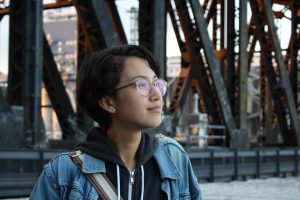 Holly C. Lam lives in Victoria, BC, and holds a BA in writing from the University of Victoria. She finds herself writing again and again about place, identity, family, and social occasion. Her fiction has previously appeared in carte blanche.
Holly C. Lam lives in Victoria, BC, and holds a BA in writing from the University of Victoria. She finds herself writing again and again about place, identity, family, and social occasion. Her fiction has previously appeared in carte blanche.

